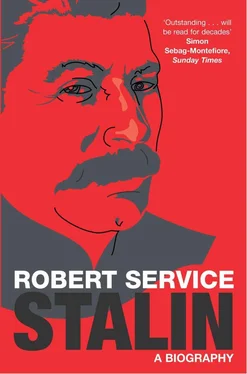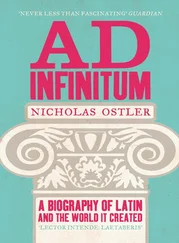It is in this connection that one of the most gruesome events of Joseph’s childhood should be interpreted. While he was a schoolboy, two ‘bandits’ were hanged on the gibbet in the centre of Gori. 18The event left a deep imprint on the boy’s mind, and many years later — when biographical details about him were published — he allowed an account of the hanging to be reproduced. His biographers have frequently adduced his remembrance of the events as evidence of his psychological peculiarity. That Joseph developed a gross personality disorder can hardly be denied. But he was not alone in witnessing or remembering the hanging. It was the most remarkable event in Gori of the last quarter of the nineteenth century. What happened was as follows. Two men of the mountains were being pursued by a policeman on horseback who tried to take possession of their cow. They resisted. In the ensuing altercation they shot him. Strife between brigands and the police was not unknown in Gori and the surrounding area. Shoot-outs occurred not infrequently. Urban inhabitants more often than not took the side opposed to the police. Hatred of the authorities was widespread. Defence of family, property and native village was thought justifiable regardless of Imperial legislation. So when the captured brigands were sentenced to death, the popular interest — and not just Joseph’s — was intense. 19
Police chief Davrishevi had anticipated the potential for unrest near the gibbet and forbade his own son to go outdoors. Joseph Dzhughashvili went accompanied by two other friends. What did they see? The popularity of the convicts led the authorities to order drummers to march to the square and to keep up a din. The sentence was announced in Russian. This too was scarcely well designed to quieten the mood of spectators. Someone tossed a stone from the crowd as the executioner, defended by soldiers, went about his business. A disturbance broke out. The police were on the point of panic as the brigands were strung up. Death was not swift in coming. The ropes had been tied inefficiently and the victims took an unbearably long time to expire. 20The town’s inhabitants did not think the punishment fitted the crime. The miscreants had not offended the local honour code: they were protecting what they thought was their own. They were local heroes. Young Davrishevi, himself the son of one of the town’s highest officials, described them as ‘holy martyrs’. 21When Joseph and his mates attended the hanging, they partook of the general atmosphere.
This is not to deny that Joseph had an unusual attraction to violence in dealing with enemies. The Empire was meting out punishment to its recalcitrant subjects. The inhabitants of Gori resented this but could do nothing to stop the process. Neither Joseph nor his friends left a record of his impressions. But it would not be improbable that he concluded that state power was a crucial determining factor in the life of society and that, if any basic change was going to happen in society, force would be needed to countervail against the status quo. He may also have thought that the drastic punishment of delinquents helped to secure a regime. Certainly there was little in his early years that discouraged a viewpoint on human affairs without a place for purposive violence.
Joseph completed his course at the end of the summer term 1894 and the Board of the Gori Spiritual School recommended him for transfer to the Tiflis Spiritual Seminary, and the paperwork was put in hand. 22His behaviour on the streets was not reproduced in the classroom, where he was a well-behaved boy as well as a quick learner who earned warm plaudits. He swiftly picked up Russian even if his accent remained heavily Georgian; he assimilated arithmetic and literature and the Bible. His schoolwork in Gori had been exemplary and he had a stupendous memory and agile intellect. He attended church regularly and had a decent singing voice, an asset for an aspiring priest as Orthodox Church services have always involved an emphasis upon choral chants. Sermons were rare and pastoral duties outside the liturgy were few. Joseph was dutiful. In Gori he was remembered as ‘very devout’. One of his fellow students, when asked for his memories in 1939, said that Joseph had punctually attended all divine services and had led the church choir: ‘I remember that he not only performed the religious rites but also always reminded us of their significance.’ 23
Despite the disruption caused by illness and factory employment, he had caught up with other pupils. The School Board was impressed. The scroll he received gave him the highest marks in every subject except arithmetic. (This was not a permanent defect: in later life he was in fact careful and effective at checking the statistical tables proffered to him by subordinates.) 24The Board Chairman inscribed the scroll with ‘excellent’ against the behaviour category. For other subjects, too, he got top marks: Old Testament, New Testament, Orthodox catechism, liturgy, Russian with Church-Slavonic, Georgian, geography, handwriting and Russian and Georgian church music. He obtained a four instead of a five in ancient Greek. 25But the blemishes were minor. Joseph Dzhughashvili had completed the course at the Gori Spiritual School with distinction. The Georgian ecclesiastical world lay at his feet. But he was a boy with a complex personality that made many acquaintances feel uncomfortable. Academically talented, he wanted to be admired as a tough lad on the streets. He loved his mother and accepted her ambitions for him and yet he was bright and had a mind of his own. Priests wrote highly of him. Yet his friends, when they came to write memoirs, recalled things about him which had echoes in his later career. They may have invented or exaggerated everything. But probably they were right that Joseph Dzhughashvili was demonstrably Stalin in the making.
Joseph Dzhughashvili, aged fifteen, left for Tbilisi in September 1894. This time he went not to the Adelkhanov Shoe Factory but to the Tiflis Spiritual Seminary. Tiflis was the conventional foreign variant of the Georgian name Tbilisi; it was used not only in Russian but also in other European languages. Founded by the Russian Imperial authorities, the Tiflis Spiritual Seminary was at the top of Pushkin Street in the heart of the city. Although provided with board and lodging free of charge, Joseph Dzhughashvili had to pay for his tuition. This would have been a problem if he had not been able to earn a regular five rubles for singing in the Zion Cathedral down by the River Mtkvari. 1He was not the only alumnus of the Gori Spiritual School who left for Tbilisi. Along with him at the Seminary were friends of his own age from Gori, including Peter Kapanadze, Joseph Iremashvili, Vano Ketskhoveli and M. Davitashvili. 2(Joseph Davrishevi, whose father earned a decent salary, could afford the fees at the First Classical Gimnazia in Tbilisi.) Loneliness was not going to be a problem for Joseph Dzhughashvili.
He was arriving in the capital of Russian Imperial power in the south Caucasus. Tbilisi at the end of the nineteenth century was the largest city in that region of the Russian Empire with 350,000 inhabitants — only Baku on the Caspian Sea with 220,000 came remotely near in size. The Viceroy lived there and governed the dozens of peoples of the region, from the northern slopes of the Caucasus range down to the Ottoman border, on behalf of Emperor Nicholas II. The east Georgian kings had chosen Tbilisi as their capital for good reason. Like Gori, it straddled the River Mtkvari, which ran north from the mountains of Turkey; still more important in earlier centuries had been the fact that it lay across one of the ancient caravan routes that had enabled trade between central Asia and Europe. Consolidating Georgia’s permanent place in the Russian Empire, the St Petersburg government built the Georgian Military Road from Vladikavkaz to Tbilisi. This route went from north to south. (The railway linking the south Caucasus with Russia went from Baku up the Caspian coast.) Two army corps were based in the garrison on Tbilisi’s east bank. Having completed the conquest of the region in the first half of the nineteenth century, the Romanovs allocated the personnel, communications and force needed to retain it.
Читать дальше












